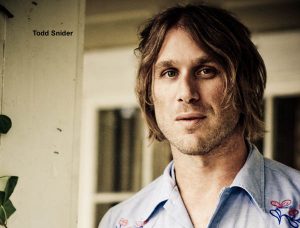Todd Snider interview
All-Star Snub

Lost amid the hoopla surrounding pitcher Zack Greinke’s hot start, this year’s Kansas City Royals are surging thanks to sweet-swingin’ singer/songwriter Todd Snider. “I was with the Cubs last year the whole way,” he admits, “watched most of the games. But I’m with the Royals now because I met some of ’em. They gave me a shirt. I think I might be on the team.” In that case, Snider, you might want to get on the field because you’re playing today. “Oh, shit,” he laughs. “I took LSD.”
We think that last bit is a joke. (If anything, Snider sounds less hallucinatory than mildly stoned.) One of his early highlights on this year’s Don Was-produced The Excitement Plan (Yep Roc), is “America’s Favorite Pastime,” a song that reimagines Pittsburgh Pirate Dock Ellis’ notorious, 1970 no-hitter — notorious because Ellis allegedly dropped acid before he got to the ballpark that day. Its unfinished chorus (“You can’t judge a book . . .”) might be a legalize-it undercurrent in the heat of baseball’s endless steroids scandal: a topical song from a topical tunesmith.
“No,” he laughs. “But innit it funny how jocks take something that they think makes ’em better and musicians, we think weed makes us better, so we smoke the shit out of it?” Was there room in the song for a nod to David Wells, who supposedly threw his no-hitter with a ruthless hangover? “I heard about that. It’s funny: Babe Ruth did a lot of his work hungover. And extremely overweight. I don’t know how old you are, but when I was a kid my dad would be watching some game and they’d be out on the bench with a [cigarette]. I remember seeing many times the coach would have a cig goin’ or the kicker would be sittin’ on the sidelines with one.”
Tracking back through Snider’s legendary digressions, however, and his interest in the Ellis tale is revealed: “I felt connected to that guy for showing up to work so ill-prepared. I feel like I’ve done that so many times in my life and gotten away with it.” And it’s possible he conducts himself so because of baseball.
“I feel like this could be my breakout year as a ballplayer,” he notes. “It’s a longtime comin’, because I’ve been getting screwed on a baseball field since I was a kid. I always told my wife that when I was a kid, I shoulda been on the all-stars and I didn’t make it. We never really got into it again after that. But I got to be on ESPN.com to answer questions [in a baseball-related chat] and somebody got on and said, ‘Man, back in Portland you shoulda been on the all-star team.’ And then some other kid got on and said, ‘No, he should not have,'” he chuckles.
“I still love baseball. I didn’t love most sports until I found out it was something you could drink and gamble to. When it made me run, I didn’t like it,” Snider sighs. “Back then, I was in top shape. Twelve-years old? I probably would have been a better guy in life [had I been picked]. ‘Little League Ruined Todd Snider’s Life.’ Have a whole article about my grievances with that, and then, at the end, ‘He also sings some shit.'”
Since his mid-’90s start, Snider has been singing “shit” in a quasi-country/talking blues/sing-speak folk manner with the occasional barn-burner like the incendiary title-track to 2006’s The Devil You Know. A self-professed disciple of Jerry Jeff Walker and Chicagoan John Prine (whose Oh Boy label was Snider’s home for years), he puts more planning into albums than you might think.
At first he’ll try to stay in character when describing how he works: “I’ll be sittin’ here with songs and one of the manager-type people will come over and be like, ‘Hey, do you have any songs?’ ‘Yeah, I’ve got about eight that I like.’ ‘When do you wanna record them?’ ‘I already recorded ’em.’ ‘When do you think you’ll have four more?’ ‘I’ll call ya.’ And then it works. Last year, I put out that EP [Peace Queer]. That was because all these people were like, ‘Can we just have somethin’? Please?’ So I was like, ‘Well here’s some stuff I’m not gonna use.'”
But, as with the Ellis legend, he eventually arrives at the truth. “The new album we just made it a million times. I can’t say what it is that makes me like a particular version more than others. Sometimes it just feels right — you know there’s a band there, but they knew not to play nothin’. And usually when I do a song on my own, the band is there. They’re just like, ‘Do this one yourself. It’s feeling too busy.’ On the new album, I’ll bet there’s multiple alternate versions of most of ’em. A few just got recorded once. [On Peace Queer] there was this poem called ‘Is This Thing Working,’ where it’s just my voice. But I recorded it 11 times. It never worked. No one could ever hear the story. But then, I was in Chicago playing at the Old Town School Of Folk and I was getting ready to try that song out. I thought, ‘I’m just gonna say it and see if people stay with me.’ And it felt like they did, so I recorded it that way. We tried 10 radically different versions of it, but I came in like, ‘Guys! I have a new idea.’ And then I said, ‘Let me do this,’ and then I just said it.”
— Steve Forstneger









